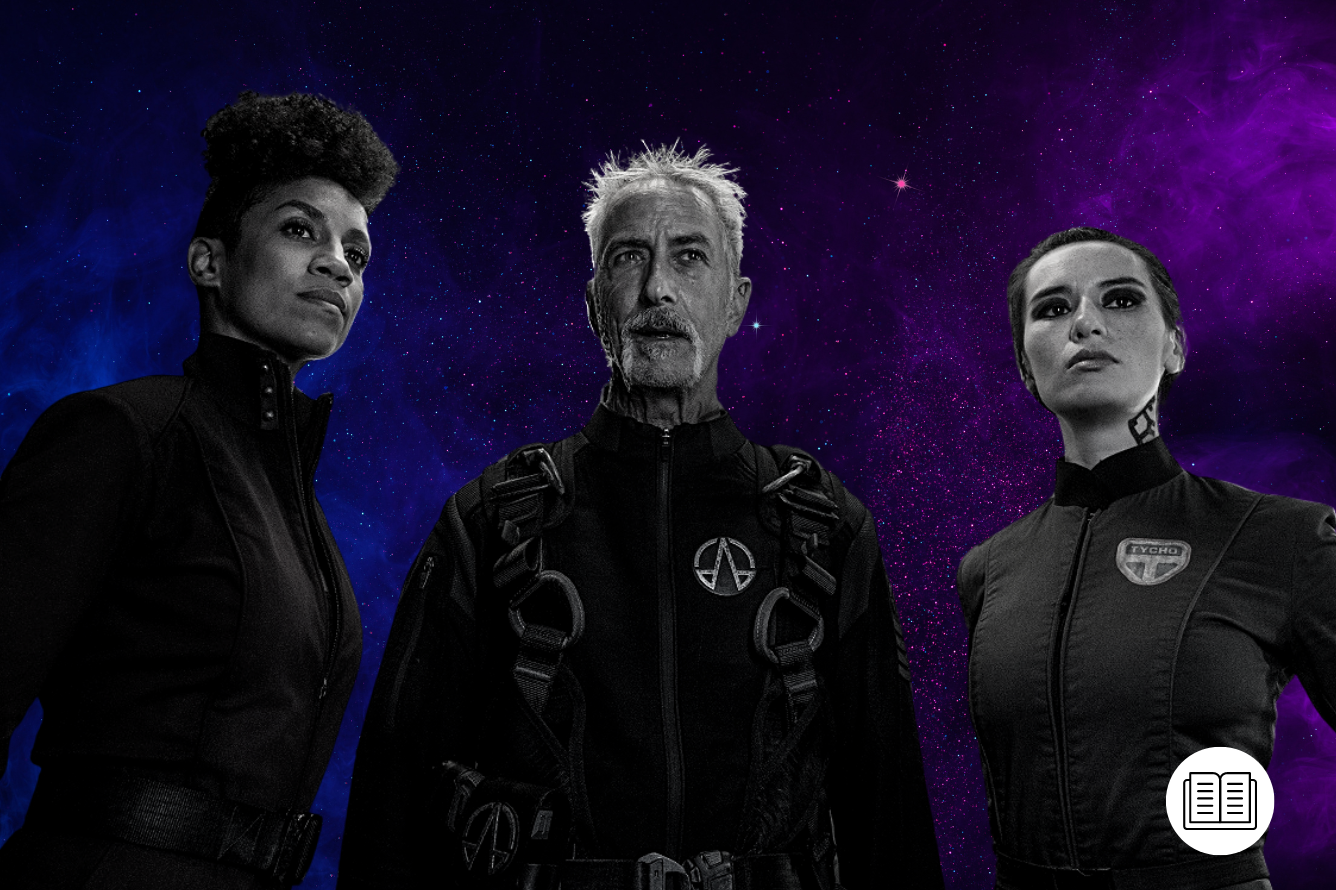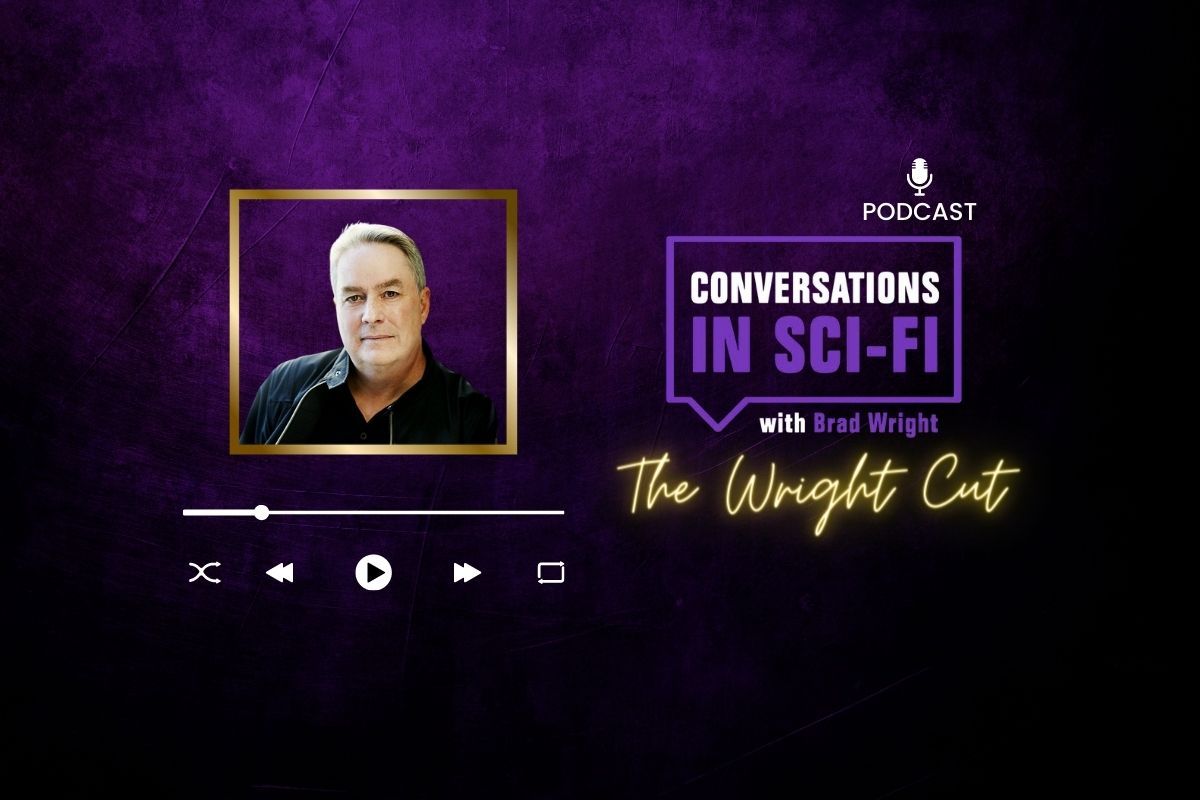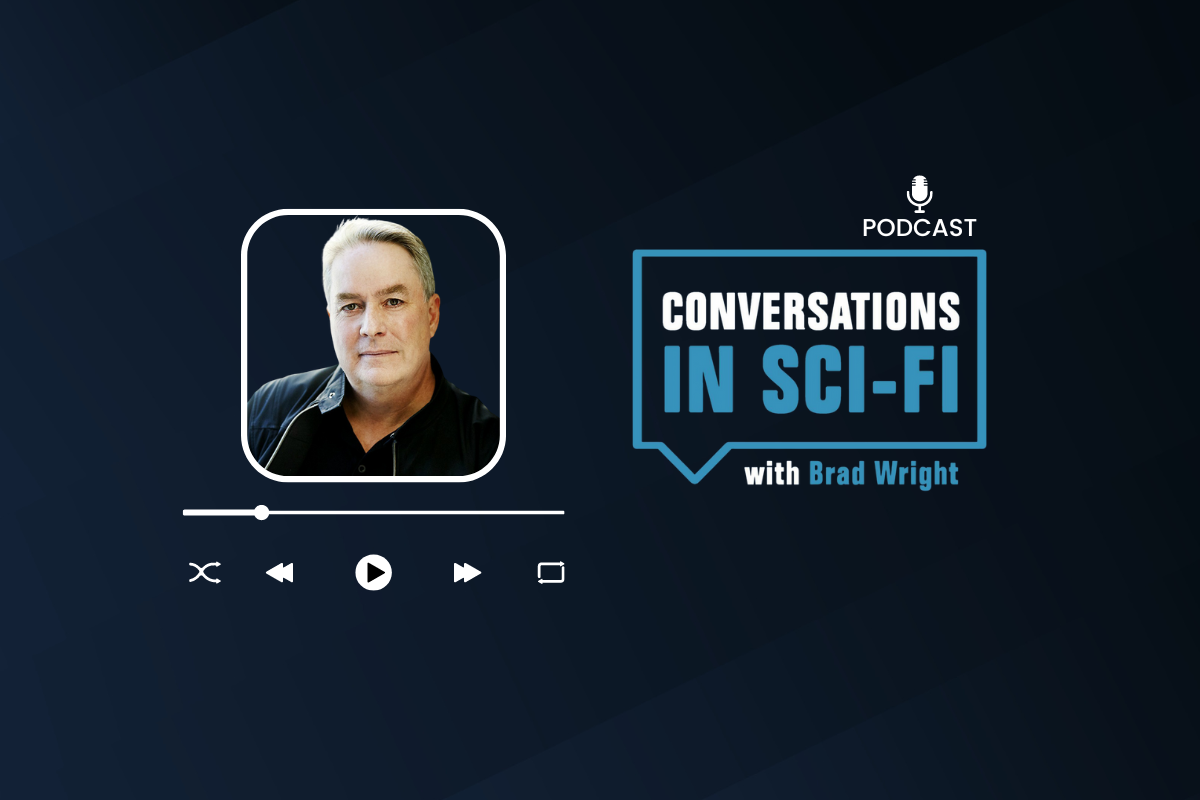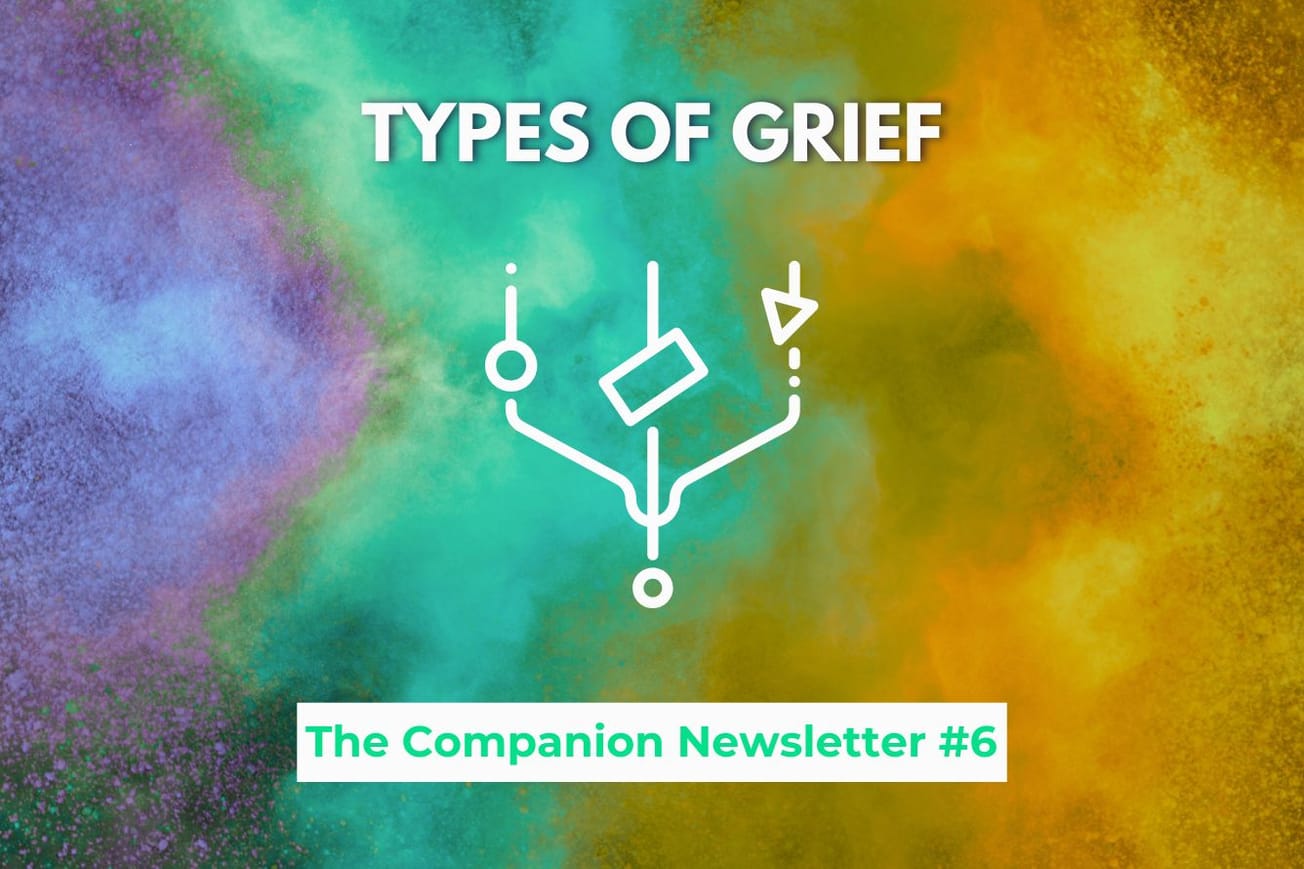The Belter language featured in The Expanse is a linguistic curiosity that has fascinated fans across the globe. There are whole fan communities online dedicated to speaking and learning the fictional language. It's time to take a deep dive into Belter and discover the languages that connect our world and The Expanse universe.
In The Expanse, the Belters sit on the margins of society. They are scattered people who have lived in space their whole lives, dwelling on space stations or ships in the asteroid belt. Belters are settlers in the emptiness whose relationships with their planet of ancestral origin is little more than economic exploitation as they extract mineral wealth to fuel the immense industries of Earth and Mars – the ‘inner planets’ – in exchange for water, air, and scant consideration. It’s a harsh existence. They have their own distinct hard-scrabble culture, symbolic tattoos marking a shared experience, minimalist sign language for communication in the vacuum, and their own spoken language and accent, Belter Creole – known in the show as ‘Belter’ or ‘Lang Belta’ – created by linguist Nick Farmer and accent coach Eric Armstrong.
It’s most evocative use early in the show comes from the Belter agitator in The Expanse episode ‘Dulcinea’ (S1, Ep1):
“Every time we demand to be heard, they hold back our water, owkwa beltalowda, ration our air, ereluf beltalowda, until we crawl back into our holes, inbobo beltalowda, and do as we are told!”
Belters are marginalized by the two superpowers and treated as a barely human underclass by bureaucrats and unscrupulous corporations. Life for Belters is routinely deadly and they endure harsh medical conditions such as weak bones that have developed out of gravity, and bodies that cannot endure a planet’s surface for too long. Despite their hardship, a whole culture and identity have formed between the groups of people spread across the solar system and it is the Belter Creole language that links them together.
Linguistic Influences on Belter Creole
Belter has roots in our world and is known as Belter Creole. A creole is a way of describing a language that has mixed with another and simplified to form a new variety. For a language to be a creole it has to have consistent grammar, a vocabulary and it has to be able to be acquired by children as a native language. A great example of a creole in our world is the Haitian creole based on French and spoken by an estimated 10-12 million people. Haitian Creole pulls in influences from Spanish, English, Portuguese, and various West African languages, predominantly Fon (spoken in Benin) and Igbo (spoken in what is now southeastern Nigeria). Like Belter Creole (and indeed, many creole languages), Haitian Creole developed as the language of the oppressed – a lingua franca to unite an exploited people uprooted from widely dispersed origins.
Nick Farmer based the rules underpinning Belter Creole on the huge migration of people of diverse cultures to Haiti, but this time he used migrants from Earth desperate for a better life in space.
He explained to Rick Liebling in a 2016 Medium article:
“The speakers live in a society similar to those found in the colonial-era Caribbean, complete with mass importation of labor from different cultures and a relatively isolated existence on islands - or space stations, in my case. In history, this led to the rise of Creole languages, so the most appropriate language to develop for The Expanse would be creole. There's the inspiration.”
Belter is a language of survival. The Belter language is their identity and it is intrinsic to who they are. Life can be harsh scavenging the asteroid belt and it seems appropriate that the language seems to be made up of many influences from Earth’s myriad linguistic melting pot. Chinese, Japanese, Slavic, Germanic, and the Romance languages – French, Italian, and Spanish – are all mingling at the forefront of life in space.
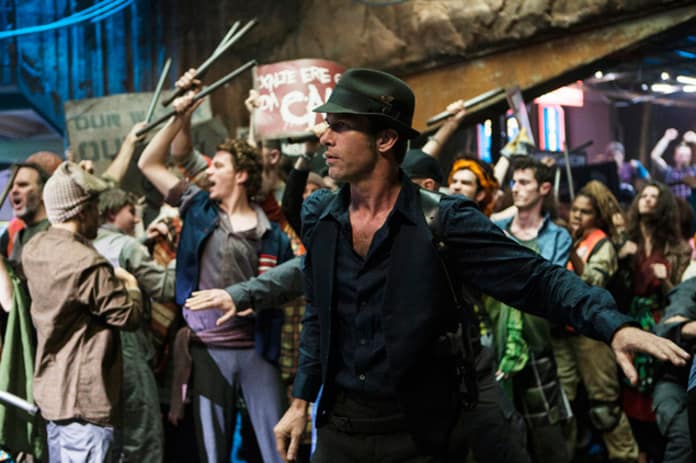
Eric Armstrong, accent coach and Associate Professor of Voice and Speech at York University in Canada, worked with Nick Farmer on the development of Belter and shared the influences of Belter Creole.
“In most cases,” he explains, “the words of the Belter language are words taken from languages such as Mandarin, Persian, Arabic, German, French, Swedish, Zulu, Portuguese, and, of course, English, and then made to conform to the rules of Belter. So ‘Space’ is kuxaku, from Japanese 空白 – kūhaku; Belter doesn’t have /h/, and replaces it with the [x] sound (as you might hear in German words like ach, or Scottish words like loch). The very common word Beltalowda, for a Belter, comes from Belter + loader (a load of/a lot of), and replaces the /er/ ending with [a] because Belter doesn’t have -r after vowels, like many accents of English.
“Though Nick had wanted the spelling of ‘ow’ to be pronounced as a short <o> as we hear in words like Todd or wrong, the spelling he chose led many to pronounce with a long <o> sounds as we hear in words like toad or row. As these words were often said by folks who didn’t get coached by me, it took on a life of its own. I justified this difference as being a word in ‘free variation’, where there might be two equally acceptable pronunciations. You say either, I say eye-ther. Let’s not call the whole thing off: it’s not a big deal!”
Linguistic Prestige means Power in any Universe
The origins of the Belter language began in the Asteroid belt as a second language or pidgin, spoken by people who moved from Earth, to reside in the colonies of space. A pidgin – also known as a patois – is different from a creole language in that it is often learned as a second language. A patois is a non-standard form of a language and carries low prestige which means it is not the language of the law and civil life and is used informally within communities. Over time and with more native speakers it becomes a creole. The prestige of a language is linked to how it is perceived in terms of the social value it carries.
In The Expanse, Belter carries the lowest prestige and is regarded in the lowest esteem compared to speakers from Earth and Mars. Earthers and Martians (collectively ‘inners’ or, in Belter, ‘inyalowda’) speak the most prestigious language variety that is portrayed in government dealings through the United Nations in English, and Admiral Sauveterre’s naval lecture was delivered in English on Mars in The Expanse episode ‘Here There be Dragons’ (S2, Ep11). Prestige is a social construct and high prestige means power in any universe.
This dimension of the Belter culture and experience has been picked up on by many of the actors taking Belter roles. Dominque Tipper, who plays Naomi Nagata, undertakes the most complex set of linguistic gymnastics as she navigates between her Belter origins and her crew of misfit Inners.
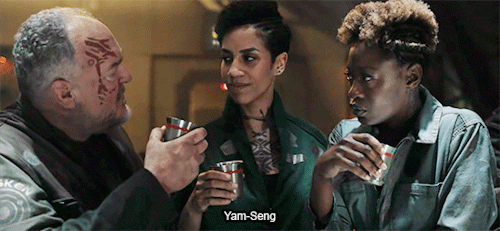
“I’m from East London, and I’m mixed-race Black, and the white side of my family is really Cockney. So, I noticed that, when I’ve had a Guinness and I’m with my family, I’m in the pub, I start to get a lot more Cockney,” she told Looper. “Equally, when I’m with Black people, my vernacular changes a bit to where I grew up in East London.
“It’s a survival instinct for her to not sound like a hardcore Belter, because across the universe, again, I almost feel like sometimes it’s like being a Black person. You don't want to show you're too ‘hood’ in certain spaces, because somebody may not give you credit.”
From the moment you hear Belter being spoken in The Expanse, it is clear that this is not a language we have heard before on Earth and this was a deliberate decision. Eric describes how the cast bought their own linguistic experiences and backgrounds to the show:
“One of the great assets of production based in Toronto is the incredible diversity of actors who make this wonderful city their home. Belters’ families are supposed to have come from all over the globe, and so many of the actors I got to work with came with either personal connections to languages, or with family histories that tied them to a language or accent. Figuring that these cultural groups will not disappear in the future, it made sense to me that there might be Greek-Belter, Arabic-Belter, Russian-Belter, Trinidadian-Belter hybrids as well.
“When an actor came for coaching prior to going to set, they would have made an attempt at the accent for the sake of their audition. Often these accent choices were often part of why they got cast! The directors/producers always wanted the actors to preserve these qualities for their final performance. So we would lean into qualities that they brought with them as part of their identities. This made for many different flavors of Belter, that I justified as being tied to the idea that maybe a bunch of folks from one region of the world ended up on one asteroid or space station, creating a Belter hybrid.
“I was trying to find a balance between Belter language and Belter-accented English,” says Eric. “In general, the producers preferred characters to speak English with a little Belter here and there, because they didn’t like subtitles. Nick Farmer, who created the Belter language, laid out a complex phonological system for the language. In many ways, the system is a kind of ‘filter’ for creating Belter words from words taken from the world’s languages.”
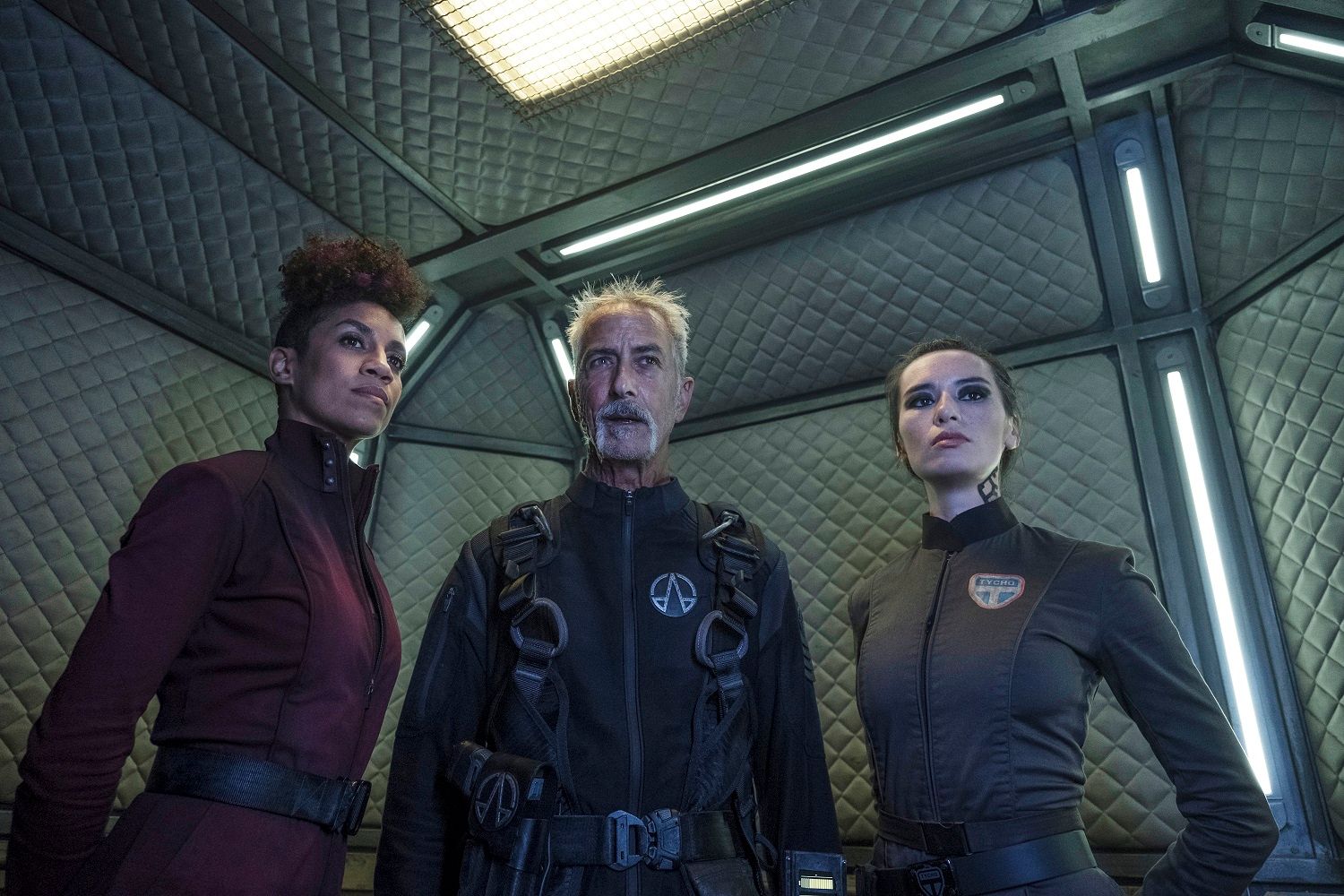
Eric describes the process of creating the sound of Belter: “I took the sounds that Nick had focused on in his phonology, and applied them to English texts. In exploring the phonology, I found that the sounds of Belter creole frequently took me to pronunciations that sounded a lot like Jamaican Creole. Being extremely wary of a sound that might come across like Jar-Jar Binks, and also with some awareness that many of the Toronto-based Black actors who would be playing Belter speaking characters have family ties to the Caribbean, I pitched to the producers that we would introduce some other elements from global languages that I felt would serve as a counter-point to those qualities.
“As some of our actors were from British backgrounds, I took the vocalized /l/ we hear at the ends of words like feel, where the /l/ comes out like the vowel ‘oo’, and which is found in many working-class South of England. I added a glottal reinforcement to final stop consonants /p, t, k/, as we hear in Cantonese accents, which was perhaps one of the most effective strategies for creating a distinctive sound. The change of /tr-/ clusters to “ch-” and /dr-/ to “j”, is a feature that I’d once heard a linguist argue was on the cards for the future of English! These all gave Belter-accented English a distinctive quality that reminded people of many accents, not just one, so one felt like they couldn’t quite put a finger on what it was.”
As a linguist, I was psyched to find the inclusion of codeswitching in The Expanse. Code-switching happens naturally whenever two languages or dialects come together. It happens in the United Kingdom today when English and Welsh came together. As touched on above, Naomi’s character was effective at communicating and code-switching between languages and dialects as she interacted with so many different groups across The Expanse universe.
“Working this out with Dominique Tipper was a lot of fun,” says Eric. “There aren’t many characters in The Expanse who are perfectly bilingual. But Naomi was one of those folks. And Dominique and I had great chats about the nature of being part of a culture that is outside the mainstream. For many multi-lingual, multi-dialectal people, when speaking in English at home or with their friend group, they will code shift to the accent they grew up speaking. So we wanted to find both confident Belter language speaking, but also a gentle version of her Belter accent that blended her accent of English with the Belter of her family.”
One of my personal favorite portrayals of Belter accent is Jared Harris’s performance as Anderson Dawes. He gave the Belter language convincing credibility from the very start and drew me into the world of Expanse.
“Jared Harris was a delight to work with,” Eric recalls, “and we spent many hours working with great care to get his accent to a point where he felt confident and in control of what he was doing. He found the t/d version of the /th/ sound to be a little challenging, and so we added the variation of the more British option of f/v. I was able to use this with other actors, who also had British backgrounds in later seasons of the show. I’d say that overall, the actors I had the good fortune of working with were very positive about the process—they enjoyed it and brought lots to the table. Keon Alexander, who played Marco Inaros, perhaps was the actor who enjoyed it the most—we were always finding ways to explore how Marco would code shift to different levels of Belter as a way of trying to bond with his Belter crew, to address the people of Earth, to talk to his family.”
It is rare to see a detailed fictional language portrayed on television that sounds incredible and authentic to boot. As a result, The Expanse has a linguistic realism that is missing in other sci-fi series and other fictional languages. It is not fixed in its portrayal either with each Belter group having their multifaceted dialectical versions of the creole within their groups. It gives it a linguistic authenticity similar to how languages manifest themselves in our world today, making The Expanse a tangible, linguistic possibility in the future.
There is nothing more human than language, and it is appropriate that the Belters have their own language that expresses what they stand for, out in the dark unknown of space.
This article was first published on December 7th, 2021, on the original Companion website.
The cost of your membership has allowed us to mentor new writers and allowed us to reflect the diversity of voices within fandom. None of this is possible without you. Thank you. 🙂


